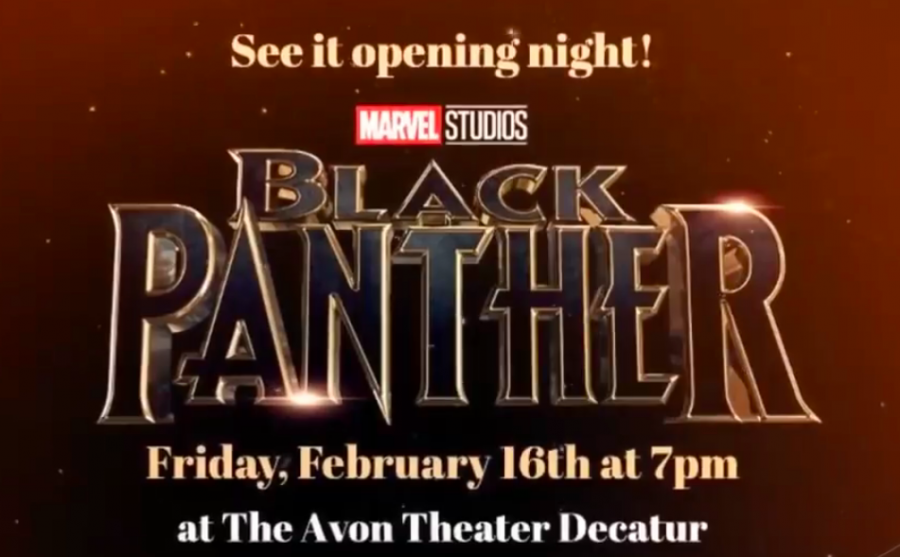From Millikin to Wakanda
Black Panther Tickets
With February in full swing, Millikin is eagerly celebrating black history. On Tuesday, Feb. 6th, in the UC Banquet Hall, five movies showed throughout the afternoon: “What Happened, Miss Simone?”, “Drum Line,” “Moonlight,” “Pride,” and “I Am Not Your Negro.”
Millikin’s African Student Organization, or ASO, has also been using film to spread joy of the occasion. The “Black Panther” ticket handout was their most popular event.
ASO’s efforts in engaging the student population in film began on Jan. 29th when members began handing out tickets to the Black Panther movie.
“I think it’s really important for young kids, especially African Americans, to see themselves in the people they watch. It’s a really big step. Not only in cinema, but especially in super heroes.” Audrianna Bartholomew, a freshman member of BSU, said.
ASO booked one of the auditoriums in the AVON theatre for opening night on Friday, Feb. 16. They ran out of tickets after the first two days out of the four they scheduled to give out tickets. However, they were offering tickets to those who would volunteer to help with clean-up and other duties.
The rapid ticket run-out is reflecting the widespread anticipation for this film. “Black Panther” sold more pre-ordered tickets than “Captain America: Civil War,” the previous record-holder for most-reserved superhero movie. This only increases this year’s particularly strong enthusiasm for celebrating black culture.
Millions of men, women, and children all over the United States are taking time to appreciate African American culture, and we can observe some of the strongest narratives of black culture in film.
One of the many “firsts” associated with this film has been the introduction of Marvel’s first African American director, Ryan Coogler. Coogler has caught the public’s eye for his previous films “Creed” and “Fruitvale Station,” becoming one of the most promising newly-emerging directors. He is also directing Marvel’s first majority-black cast.
This majority-black cast was critical in the creation of rounded African characters.
“’Black Panther’ creates a precedent that kills the ability of folks to misrepresent and distort the continent,” Danai Gurira, who plays Okoye in the movie said in an interview with Huron Daily Tribune, “The things that it checks off: Complex African female characters; African language on a big screen; African characters who are varied in many different ways and heroic; The heroism of Africans for themselves and not needing a white hero — go figure — to reach their goals; Celebrating so many specific African cultural-isms.
Typically, when a token black character occurs in a white-majority television show or film, they become one-dimensional, stereotypical, or even offensive. White superheroes have always been given more attention when it came to developing their character.
“Thor and Tony Stark didn’t have the burden of being a social commentary in the Trump era.” Aamna Mohdin and Lynsey Chutel wrote in their article on Quartzy.com titled, “’Black Panther’ Is More Than a Film. It Carries the Hopes of the Global African Diaspora.”
In the wake of tension and turmoil concerning race in the media, many critics have hailed “Black Panther,” as an antidote for the negative, objective, and downright ignorant stereotypes of African culture, one of them being that Africa is completely impoverished and robbed of its resources. Wakanda, Black Panther’s fictional home country, is far from impoverished.
“I think it’s really great to depict Africa in a positive light, especially because usually in the media, it’s portrayed like a really poor and grief-stricken area that doesn’t have any food or roads.” Bartholomew said.
This movie is coming out, coincidentally, after the widespread outcry of President Trump’s tweet, calling several African nations, “s***hole countries.” Though fictional, the portrayal of Wakanda is prompting news providers to explain to the public that Africa is more developed than many believe. The small, isolated, and protected nation, which was never fully discovered during the colonization of Africa, is also raising a question everyone should consider during black history month: What would Africa be like if Europeans never colonized it?
This question has never been a factor in a Marvel superhero movie, neither has a mostly-black cast and complex characters. “Black Panther” has, therefore, become a breath of fresh air for millions around the globe, from Africa to Millikin University.

